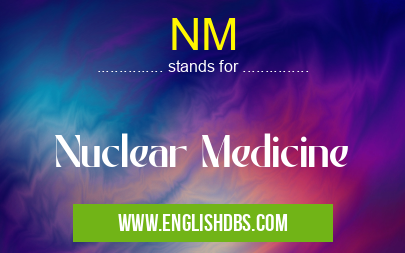What does NM mean in NUCLEAR
NM stands for Nuclear Medicine, which is a branch of medicine that uses radioactive substances to diagnose and treat diseases. Nuclear Medicine procedures involve the administration of small amounts of radioactive materials, which are then detected by specialized imaging equipment to provide detailed information about the structure and function of organs and tissues.

NM meaning in Nuclear in Academic & Science
NM mostly used in an acronym Nuclear in Category Academic & Science that means Nuclear Medicine
Shorthand: NM,
Full Form: Nuclear Medicine
For more information of "Nuclear Medicine", see the section below.
How NM Works
- Radioactive Tracers: Radioactive tracers are injected into the body, where they accumulate in specific organs or tissues based on their physiological or biochemical properties.
- Imaging Equipment: Specialized imaging equipment, such as gamma cameras and PET scanners, detect the emitted radiation from the radioactive tracers.
- Image Generation: The detected radiation is processed to generate images that provide insights into the anatomy, function, and metabolic activity of the targeted organs or tissues.
Applications of NM
- Diagnostic Imaging: Diagnosis of a wide range of diseases, including cancer, heart disease, and neurological disorders.
- Therapy: Treatment of certain types of cancer, such as thyroid cancer and some lymphomas, using radioactive iodine or other targeted agents.
- Research: Studying the physiology and biochemistry of organs and tissues to gain insights into disease mechanisms and develop new treatments.
Advantages of NM
- Non-Invasive: Most NM procedures are non-invasive, involving the administration of a small amount of radioactive material without the need for surgery.
- Precise Imaging: Nuclear Medicine provides detailed and precise images of the targeted organs or tissues, allowing for accurate diagnosis and treatment planning.
- Functional Information: NM can provide insights into the metabolic activity and function of organs and tissues, beyond anatomical structures.
Essential Questions and Answers on Nuclear Medicine in "SCIENCE»NUCLEAR"
What is Nuclear Medicine (NM)?
Nuclear Medicine is a branch of medicine that uses small amounts of radioactive substances to diagnose and treat a wide range of medical conditions. These radioactive substances, called radiopharmaceuticals, are injected into the body and emit radiation that can be detected by special cameras. The images produced by these cameras allow doctors to see how organs and tissues are functioning.
What are the benefits of NM?
NM offers several benefits, including:
- Non-invasive procedures: NM procedures are typically non-invasive, meaning they do not require surgery or anesthesia.
- Accurate and detailed images: NM can provide detailed images of organs and tissues, allowing doctors to accurately diagnose and monitor medical conditions.
- Early detection: NM can often detect diseases at an early stage, when they are more treatable.
- Treatment options: Some NM procedures can also be used to treat certain medical conditions, such as thyroid cancer.
What are the risks of NM?
The risks of NM are generally low. However, as with any medical procedure, there are some potential risks, including:
- Radiation exposure: NM procedures involve the use of radioactive substances, which can expose patients to low levels of radiation.
- Allergic reactions: Some patients may experience allergic reactions to the radiopharmaceuticals used in NM procedures.
- Side effects: Some NM procedures may cause side effects, such as nausea, vomiting, or dizziness.
What conditions can be diagnosed and treated with NM?
NM can be used to diagnose and treat a wide range of medical conditions, including:
- Cancer: NM can be used to diagnose and stage various types of cancer, including thyroid cancer, lung cancer, and breast cancer.
- Heart disease: NM can be used to assess blood flow to the heart and diagnose conditions such as coronary artery disease.
- Bone disorders: NM can be used to diagnose and monitor bone disorders, such as osteoporosis and arthritis.
- Neurological disorders: NM can be used to diagnose and monitor neurological disorders, such as Alzheimer's disease and Parkinson's disease.
Final Words: NM (Nuclear Medicine) is a valuable medical specialty that utilizes radioactive substances for both diagnostic imaging and therapeutic purposes. By providing detailed and functional information about organs and tissues, NM plays a crucial role in the diagnosis and treatment of a wide range of diseases.
NM also stands for: |
|
| All stands for NM |
